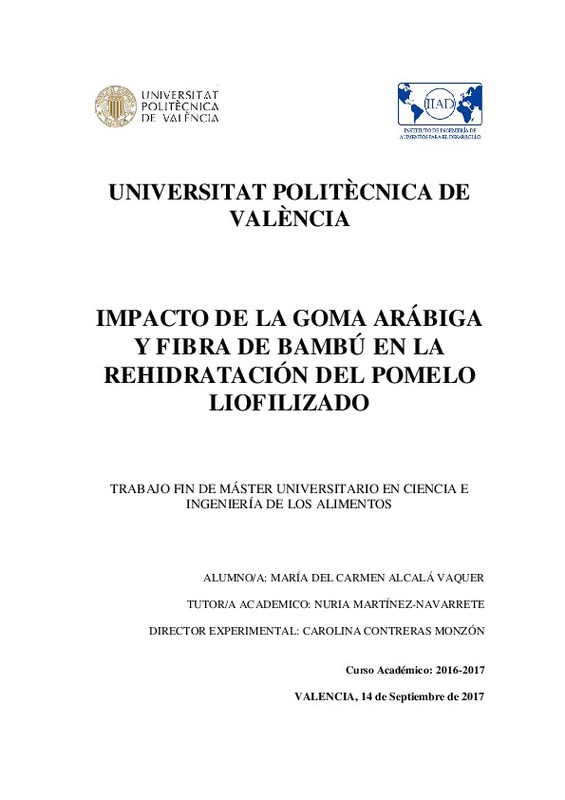JavaScript is disabled for your browser. Some features of this site may not work without it.
Buscar en RiuNet
Listar
Mi cuenta
Estadísticas
Ayuda RiuNet
Admin. UPV
Impacto de la goma arábiga y fibra de bambú en la rehidratación de pomelo liofilizado
Mostrar el registro sencillo del ítem
Ficheros en el ítem
| dc.contributor.advisor | Martínez Navarrete, Nuria
|
es_ES |
| dc.contributor.author | Alcalá Vaquer, María del Carmen
|
es_ES |
| dc.date.accessioned | 2017-10-19T18:01:23Z | |
| dc.date.available | 2017-10-19T18:01:23Z | |
| dc.date.created | 2017-09-27 | |
| dc.date.issued | 2017-10-19 | es_ES |
| dc.identifier.uri | http://hdl.handle.net/10251/89638 | |
| dc.description.abstract | [ES] La liofilización es un proceso tecnológico que permitiría obtener fruta en polvo de alta calidad. Su rehidratación, en las condiciones adecuadas, proporcionará un zumo de la fruta también de alta calidad. Para favorecer el proceso y mejorar la estabilidad de la fruta en polvo, es frecuente la incorporación de solutos de alto peso molecular, lo que puede afectar a su posterior rehidratación, así como a las características del producto rehidratado. En este trabajo se caracterizó el comportamiento frente a la rehidratación de un producto liofilizado a base de pomelo, así como también el tamaño de partícula y propiedades ópticas del producto rehidratado. Se analizó la influencia de la incorporación, a diferentes concentraciones, de goma arábiga y fibra de bambú como estabilizantes del producto liofilizado. Para ello se estudió la solubilidad de cada muestra liofilizada formulada, registrando el aumento de sólidos solubles con el tiempo de rehidratación, a 5, 15 y 25 ºC. A las muestras rehidratadas se les analizó el tamaño de partícula por difracción láser y el color en el espacio CIE L*a*b*a partir del espectro de transmitancia. Los resultados obtenidos parecen indicar la buena solubilidad de los biopolímeros añadidos, a cualquiera de las temperaturas estudiadas, el comportamiento inicial de las muestras frente a la rehidratación se ve algo dificultado por éstos, aunque favorecido por el pretratamiento de microondas. En cuanto a la caracterización del producto rehidratado, la adición de biopolímeros afectó significativamente al tamaño de partícula y a las propiedades ópticas. No obstante, el pequeño efecto observado en este sentido, recomienda su uso. | es_ES |
| dc.description.abstract | [EN] Freeze-drying is a technological process that would allow obtaining high quality fruit powder. Its rehydration, in the right conditions, will provide a fruit juice also of high quality. In order to favor the process and to improve the stability of the powdered fruit, the incorporation of high molecular weight solutes is frequent, which can affect its subsequent rehydration, as well as the characteristics of the rehydrated product. In this work the rehydration behavior of a freeze-dried product based on grapefruit was characterized, as well as the particle size and optical properties of the rehydrated product. The influence of the incorporation, at different concentrations, of gum arabic and bamboo fiber as stabilizers of the freeze-dried product was analyzed. To this end, the solubility of each freeze-dried sample was studied, recording the increase of soluble solids with the rehydration time, at 5, 15 and 25 ºC. The rehydrated samples were analyzed for particle size by laser diffraction and color in the CIE L*a*b* space from the transmittance spectrum. The results obtained seem to indicate the good solubility of the added biopolymers, at any of the temperatures studied, although the initial behavior of the samples against rehydration is somewhat hampered by these, while favored by microwave pretreatment. Regarding the characterization of the rehydrated product, the addition of biopolymers significantly affected particle size and optical properties. However, the small effect observed in this regard, recommends its use. | es_ES |
| dc.format.extent | 22 | es_ES |
| dc.language | Español | es_ES |
| dc.publisher | Universitat Politècnica de València | es_ES |
| dc.rights | Reserva de todos los derechos | es_ES |
| dc.subject | Color | es_ES |
| dc.subject | Freeze-drying grapefruit powder | es_ES |
| dc.subject | Stabilizing biopolymers | es_ES |
| dc.subject | Rehydration | es_ES |
| dc.subject | Solubility | es_ES |
| dc.subject | Particle size | es_ES |
| dc.subject | Pomelo liofilizado en polvo | es_ES |
| dc.subject | Biopolímeros estabilizantes | es_ES |
| dc.subject | Rehidratación | es_ES |
| dc.subject | Solubilidad | es_ES |
| dc.subject | Tamaño de partícula | es_ES |
| dc.subject.classification | TECNOLOGIA DE ALIMENTOS | es_ES |
| dc.subject.other | Máster Universitario en Ciencia e Ingeniería de los Alimentos-Màster Universitari en Ciència i Enginyeria Dels Aliments | es_ES |
| dc.title | Impacto de la goma arábiga y fibra de bambú en la rehidratación de pomelo liofilizado | es_ES |
| dc.type | Tesis de máster | es_ES |
| dc.rights.accessRights | Abierto | es_ES |
| dc.contributor.affiliation | Universitat Politècnica de València. Escuela Técnica Superior de Ingeniería Agronómica y del Medio Natural - Escola Tècnica Superior d'Enginyeria Agronòmica i del Medi Natural | es_ES |
| dc.contributor.affiliation | Universitat Politècnica de València. Departamento de Tecnología de Alimentos - Departament de Tecnologia d'Aliments | es_ES |
| dc.description.bibliographicCitation | Alcalá Vaquer, MDC. (2017). Impacto de la goma arábiga y fibra de bambú en la rehidratación de pomelo liofilizado . http://hdl.handle.net/10251/89638 | es_ES |
| dc.description.accrualMethod | TFGM | es_ES |
| dc.relation.pasarela | TFGM\33855 | es_ES |
Este ítem aparece en la(s) siguiente(s) colección(ones)
-
ETSIAMN - Trabajos académicos [3541]
Escuela Técnica Superior de Ingeniería Agronómica y del Medio Natural






